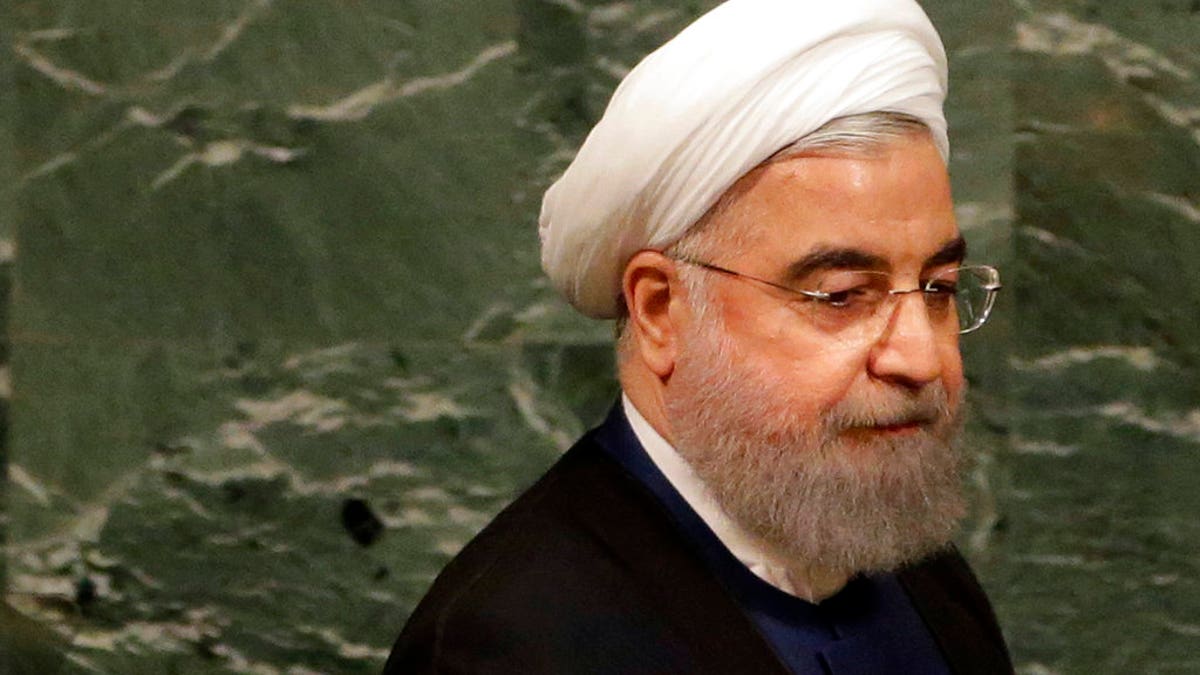
Iranian President Hassan Rouhani has warned the U.S. of "grave" consequences should President Trump decide to withdraw from the nuclear deal. (AP)
Iran’s regime has not stopped its drive to secure technology and scientific knowledge to produce weapon of mass destruction, the intelligence agency of the German state of Baden-Württemberg disclosed in a report last week.
“Iran continued to undertake, as did Pakistan and Syria, efforts to obtain goods and know-how to be used for the development of weapons of mass destruction and to optimize corresponding missile delivery systems,” said the intelligence document, reviewed by FoxNews.com.
The intelligence agency — the State Office for the Protection of the Constitution — monitors threats to Germany’s democratic, constitutional order and is the equivalent of the FBI, operating at the state level. The counterespionage officials wrote that Iran’s illicit activities in Germany are concentrated in the classic sectors for espionage: politics, the economy, science, the military and the armaments industry.
“The observation and combating of proliferation efforts of ... Iran was also an important task of counterintelligence" in 2017 in Baden-Württemberg, said the report.
Scores of specialized technology and engineering companies are located in the southwestern state. FoxNews.com reported in February that Iranian businessmen purchased material from the Krempel firm in Baden-Württemberg that later turned up in chemical rockets used to gas Syrian civilians in January and February.
Even after the revelation of the German construction material in the Iranian-produced chemical rockets, Germany’s Federal Office for Economic Affairs and Export Control declined to halt trade between Krempel and the Islamic Republic.
The Baden-Württemberg intelligence officials said they had gathered “intensive intelligence on activities of Iran’s spy agencies.”
The 345-page report, released May 24, devotes lengthy sections to Iran’s sponsorship of the Lebanese terrorist organization Hezbollah, and to Tehran’s espionage agencies and state agencies of repression — the Ministry of Intelligence of the Islamic Republic of Iran, and Revolutionary Guards Intelligence.
Last month, President Trump pulled the plug on the Iran nuclear deal, formally known as the Joint Comprehensive Plan of Action (JCPOA), saying the agreement did not advance American security interests. Trump said that “not only does the deal fail to halt Iran’s nuclear ambitions, but it also fails to address the regime’s development of ballistic missiles that could deliver nuclear warheads,” adding that “finally, the deal does nothing to constrain Iran’s destabilizing activities, including its support for terrorism.”
German intelligence officials, who wrote the report prior to Trump’s May 8 decision to withdraw the U.S. from the nuclear deal, said Tehran’s “current worsening relations with the U.S.A., as well as Western governments’ critical views toward Iran’s atomic program, may lead to an increase of Iranian espionage activities.”
The report noted that Iran continues to spy on Iranian dissidents in Germany who oppose the clerical leadership in Tehran.
According to the report, “Iran has continued unchanged the pursuit of its ambitious program to acquire technology for its rocket and missile delivery program.” Iran’s reported test of the mid-range Khorramshahr rocket in September was noted.
Iran’s regime seeks German software, sophisticated vacuum and control engineering technologies, measurement devices and advanced electrical equipment for its missile program, said the report. Germany has been the European country most reluctant to crack down on trade with the Islamic Republic.
Last year, FoxNews.com reported that Iran's efforts to develop its nuclear and missile programs resulted in "32 procurement attempts ... that definitely or with high likelihood were undertaken for the benefit of proliferation programs," in the state of North Rhine-Westphalia.
Richard Grenell, the new American ambassador to Berlin — and a former Fox News contributor — reiterated U.S. policy in May in a tweet, writing: “As @realDonaldTrump said, US sanctions will target critical sectors of Iran’s economy. German companies doing business in Iran should wind down operations immediately.”
Each of Germany's 16 states has a dometsic intelligence agency. FoxNews.com’s examination of additional intelligence reports released in April and May from the German states of Bavaria, Saxony-Anhalt, Schleswig-Holstein and Saxony detailed, in terms similar to those in the Baden-Württemberg document, Iran’s illicit procurement behavior in Germany and its threat to international security.
Benjamin Weinthal reports on human rights in the Middle East and is a fellow at the Foundation for Defense of Democracies. Follow him on Twitter @BenWeinthal








































